Interested in the workings of heat pumps? Come along as we explore the detailed mechanisms of their heat energy movement.
In this article, we will explore the role of refrigerants, compression and expansion processes, evaporators and condensers, heat exchange, temperature differences, and the efficiency and performance of heat pumps.
Get ready to uncover the secrets behind heat pumps’ efficient and effective thermal energy transfer!
Key Takeaways
- Heat pumps transfer thermal energy through mechanical work using a refrigerant.
- The choice of refrigerant impacts the performance and efficiency of heat pumps.
- Refrigerants can have environmental implications and contribute to global warming.
- The efficiency of heat pumps is influenced by the choice of refrigerant.
The Basics of Heat Pumps’ Thermal Energy Transfer
Let’s start by understanding how heat pumps transfer thermal energy.

Heat pumps are devices that utilize mechanical work to transfer heat from one location to another. They achieve this through a process called thermal energy transfer.
The mechanics of a heat pump involve the use of a refrigerant, which acts as a medium for absorbing and releasing heat. The heat pump extracts thermal energy from a low-temperature source, such as the outside air or the ground, and transfers it to a high-temperature destination, such as the inside of a building.
This transfer is made possible by the refrigerant, which undergoes a cycle of compression, condensation, expansion, and evaporation. By manipulating these thermodynamic processes, heat pumps can efficiently move thermal energy from one place to another, providing heating or cooling as needed.
Understanding the Role of Refrigerants in Heat Pump Mechanics
When it comes to understanding the role of refrigerants in heat pump mechanics, there are several key points to consider.

Firstly, the refrigerant heat transfer process is crucial in ensuring effective thermal energy transfer within the system.
Secondly, the choice of refrigerant can have a significant impact on the overall performance and efficiency of the heat pump.
Lastly, careful consideration and selection of the appropriate refrigerant is essential to optimize the heat pump’s efficiency and environmental impact.
Refrigerant Heat Transfer Process
Refrigerants play a crucial role in the heat transfer process within heat pump mechanics. These substances are selected based on their specific properties to ensure efficient heat exchange.
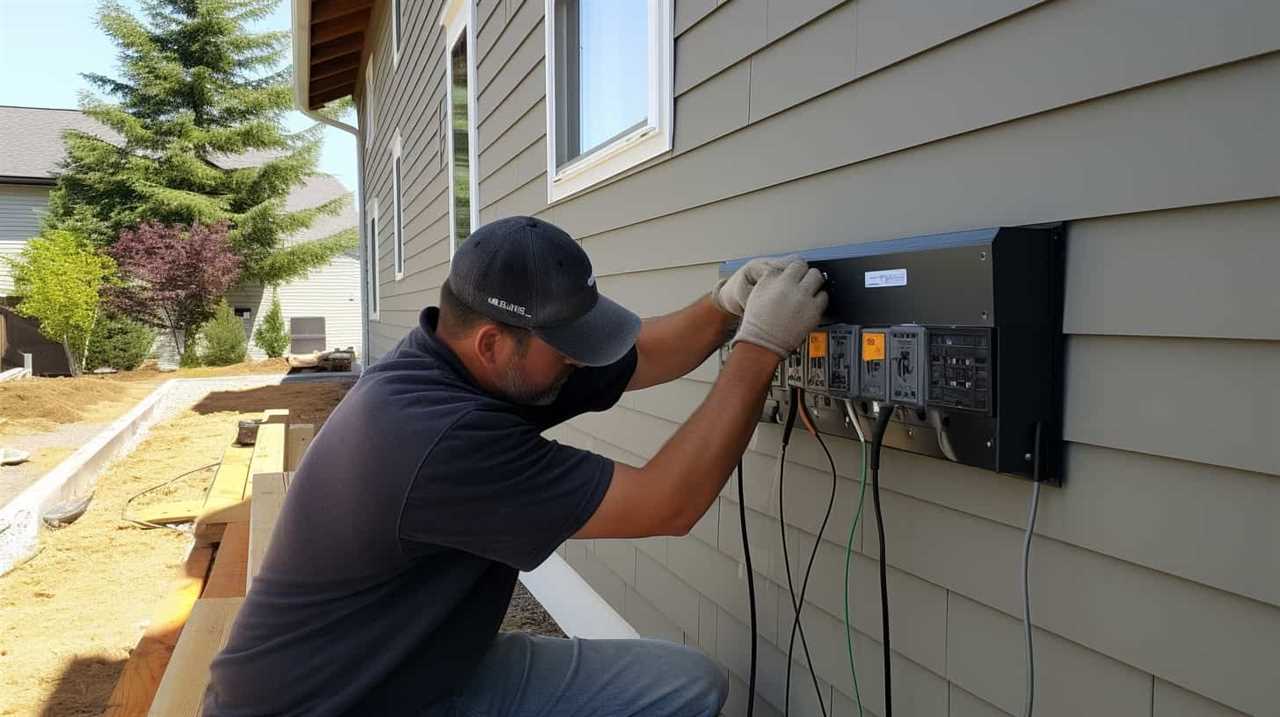
During the heat pump cycle, the refrigerant undergoes various stages, including compression, condensation, expansion, and evaporation. Each stage involves the transfer of heat between the refrigerant and the surrounding environment.
In the compression stage, the refrigerant is pressurized, increasing its temperature. This high-temperature gas then undergoes condensation, releasing heat as it changes state into a liquid. The liquid refrigerant then passes through an expansion valve, causing it to evaporate and absorb heat from the surrounding environment. This low-temperature gas is then compressed again to repeat the cycle.
Understanding the refrigerant heat transfer process is crucial for optimizing heat pump performance. The choice of refrigerant can have a significant impact on the efficiency, environmental impact, and overall effectiveness of the heat pump system.
In the next section, we’ll explore the importance of selecting the right refrigerant and its impact on heat pump mechanics.
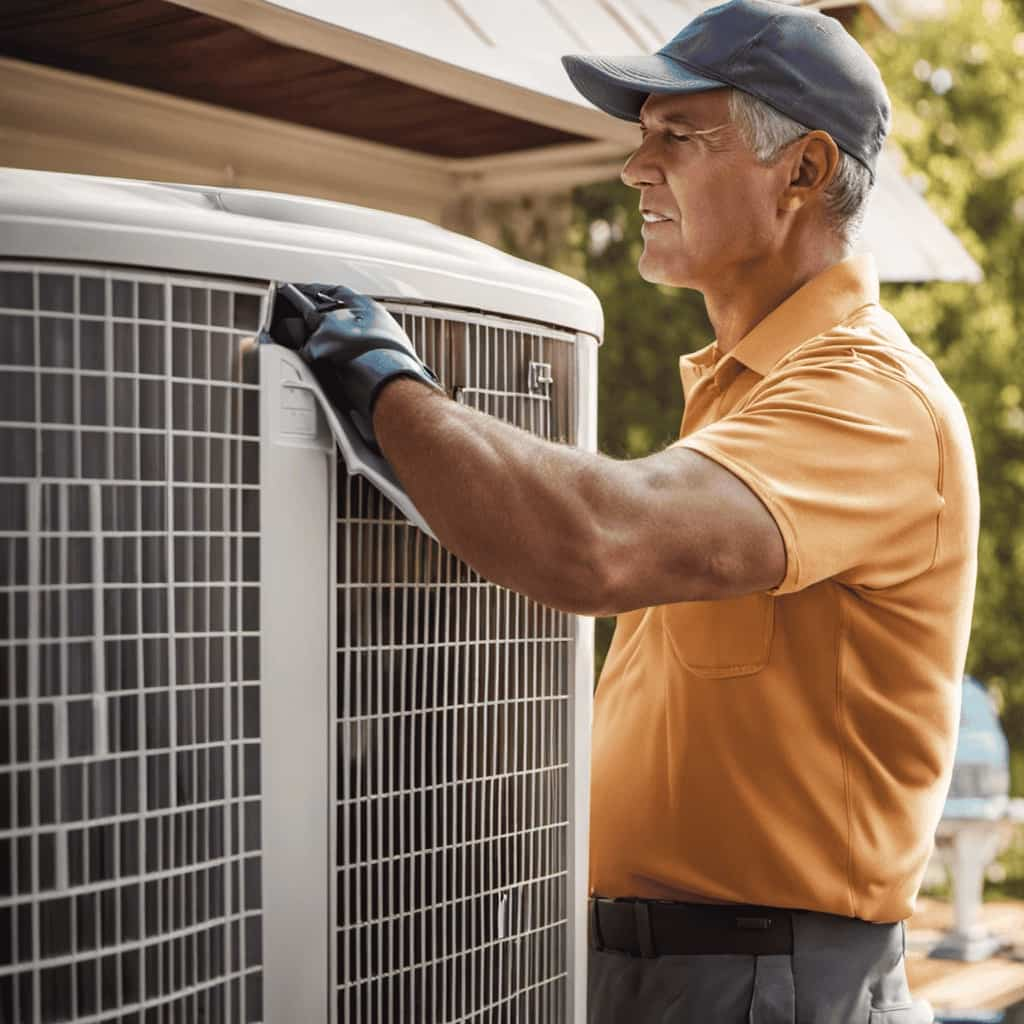
Impact of Refrigerant Choice
As we delve into the impact of refrigerant choice, it’s important to understand the role that refrigerants play in heat pump mechanics. Refrigerants are crucial components in heat pumps as they facilitate the transfer of thermal energy. The choice of refrigerant has significant implications for both the environment and energy consumption.
When it comes to environmental implications, refrigerants can have varying effects on the ozone layer and contribute to global warming. Certain refrigerants, such as chlorofluorocarbons (CFCs) and hydrochlorofluorocarbons (HCFCs), have been found to deplete the ozone layer and have a high global warming potential. In contrast, newer refrigerants like hydrofluorocarbons (HFCs) have lower global warming potentials but still contribute to climate change.
In terms of energy consumption, the choice of refrigerant can impact the efficiency of a heat pump. Some refrigerants have better heat transfer properties, allowing for more efficient heat exchange and reducing energy consumption. Additionally, the performance of a heat pump can be affected by the refrigerant’s thermodynamic properties, such as its boiling point and specific heat capacity.
Considering the environmental implications and energy consumption, it’s crucial to carefully select the appropriate refrigerant for a heat pump, striking a balance between efficiency and environmental impact. By choosing refrigerants with lower global warming potentials and optimizing heat transfer properties, we can minimize the environmental footprint of heat pumps while maximizing their energy efficiency.

Efficiency and Refrigerant Selection
To ensure optimal efficiency in heat pump mechanics, it’s essential that we understand the role of refrigerants and carefully select the most suitable option.
The efficiency analysis of heat pumps involves evaluating the ability of a system to transform electrical energy into thermal energy. One key factor affecting efficiency is the choice of refrigerant.
Refrigerant regulations play a significant role in determining the options available to us. The selection process involves considering factors such as thermodynamic properties, environmental impact, safety, and cost.
Different refrigerants have varying heat transfer capabilities, which directly influence the overall efficiency of the heat pump system.
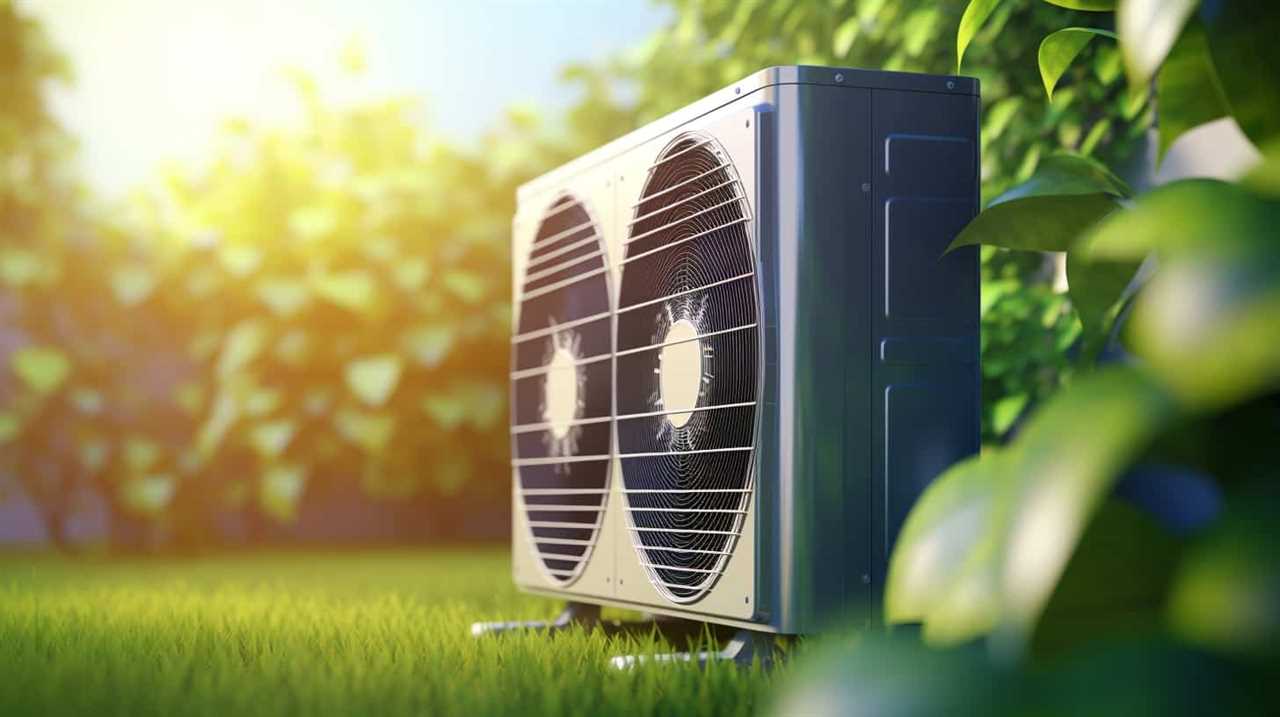
Additionally, regulations surrounding refrigerant usage are continuously evolving, with a focus on reducing the environmental impact of these substances. Therefore, selecting the right refrigerant is crucial for achieving optimal efficiency in heat pump mechanics while adhering to current regulations.
Exploring the Compression and Expansion Processes in Heat Pumps
We will now delve into the compression and expansion processes in heat pumps, which play a crucial role in their overall functionality.
The compression process involves increasing the pressure and temperature of the refrigerant, while the expansion process involves reducing the pressure and temperature.
During the compression process, the refrigerant is drawn into the compressor, where it’s compressed by decreasing the volume, thereby increasing the pressure and temperature. This high-pressure, high-temperature refrigerant is then sent to the condenser, where it releases heat to the surrounding environment.

Next, the expansion process begins. The high-pressure refrigerant enters the expansion valve, where its pressure is reduced, causing it to expand rapidly. This expansion results in a drop in temperature, allowing the refrigerant to absorb heat from the source, such as the air or ground.
The Importance of Evaporators and Condensers in Thermal Energy Transfer
Evaporators and condensers are vital components in the transfer of thermal energy within heat pumps.
The evaporator plays a crucial role in absorbing heat from the surrounding environment, while the condenser is responsible for releasing heat to the desired location.
The performance of the evaporator greatly affects the overall efficiency of the heat pump system. It’s important to design the evaporator in a way that maximizes heat transfer, ensuring rapid and efficient cooling.

On the other hand, the condenser design should focus on facilitating the release of heat in an efficient manner, allowing for effective heating.
By optimizing both the evaporator performance and condenser design, heat pumps can provide reliable and efficient thermal energy transfer.
Now, let’s move on to examining the heat exchange in heat pumps’ thermal energy transfer.
Examining the Heat Exchange in Heat Pumps’ Thermal Energy Transfer
- As we delve deeper into the mechanics of heat pumps, let’s explore the intricate heat exchange that occurs during thermal energy transfer.
- Heat pumps, with their ability to efficiently move heat from one place to another, have undergone significant advancements in technology. These advancements aim to optimize heat pump performance, ensuring maximum energy efficiency and cost-effectiveness.
- Here are five key points to consider in understanding the heat exchange process in heat pumps:
- Heat pumps transfer heat through a refrigerant, which absorbs heat from a low-temperature source and releases it to a high-temperature sink.
- The refrigerant undergoes phase changes, transitioning from a low-pressure vapor to a high-pressure liquid in the condenser and then back to a low-pressure vapor in the evaporator.
- Heat is transferred from the source to the refrigerant in the evaporator, where it evaporates the refrigerant by absorbing thermal energy.
- The refrigerant, now in vapor form, is compressed by the compressor, increasing its temperature and pressure.
- In the condenser, the refrigerant releases heat to the sink, condensing back into a high-pressure liquid.
- Understanding the intricacies of heat exchange in heat pumps is crucial for optimizing their performance. With this knowledge, we can now explore the impact of temperature difference on heat pump efficiency in the next section.
The Impact of Temperature Difference on Heat Pump Efficiency
Let’s delve into how the temperature difference affects the efficiency of heat pumps.
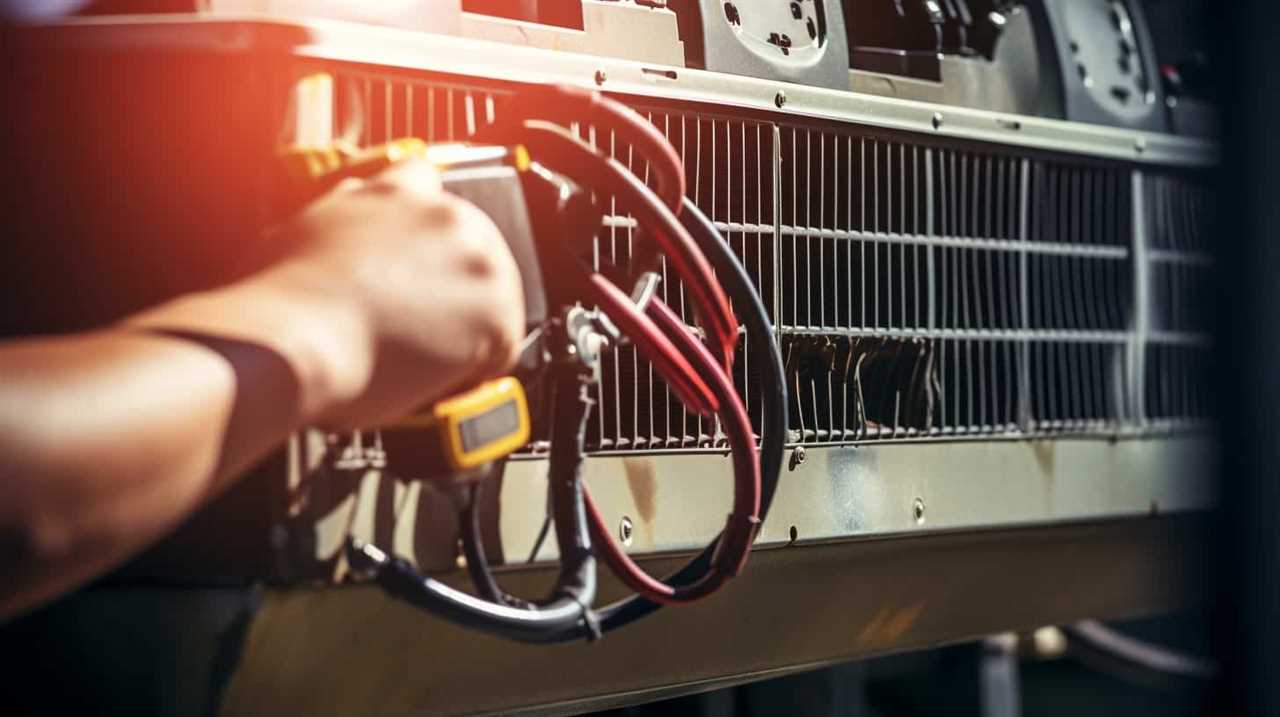
The effect of climate on heat pump efficiency is significant. In colder climates, where the temperature difference between the air outside and the desired indoor temperature is larger, the heat pump needs to work harder to extract heat from the outside air. This increased workload can reduce the overall efficiency of the heat pump.
On the other hand, in warmer climates, the temperature difference is smaller, allowing the heat pump to operate more efficiently.
Additionally, the impact of insulation on heat pump performance can’t be understated. Proper insulation helps to minimize heat loss, reducing the temperature difference that the heat pump needs to overcome. This results in improved efficiency and lower energy consumption.
Therefore, both the climate and insulation play crucial roles in determining the efficiency of heat pumps.
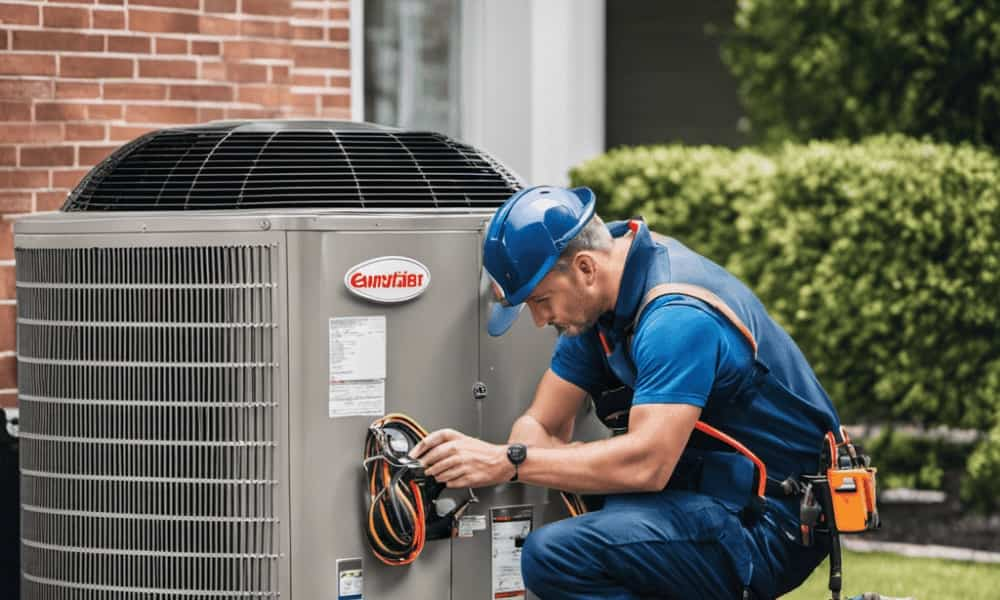
Investigating the Role of Heat Exchangers in Heat Pump Operations
We frequently rely on heat exchangers to facilitate the efficient operation of heat pumps. Heat exchangers play a crucial role in optimizing heat pump efficiency by enabling the transfer of thermal energy between different fluids or mediums.
Here are five key points that highlight the importance of heat exchangers in heat pump operations:
-
Heat exchangers allow for the transfer of heat from a low-temperature source to a high-temperature sink, which is essential for heat pumps to operate effectively.
-
They help in maintaining the desired temperature in the space being heated or cooled by transferring heat from the heat source to the heat sink.
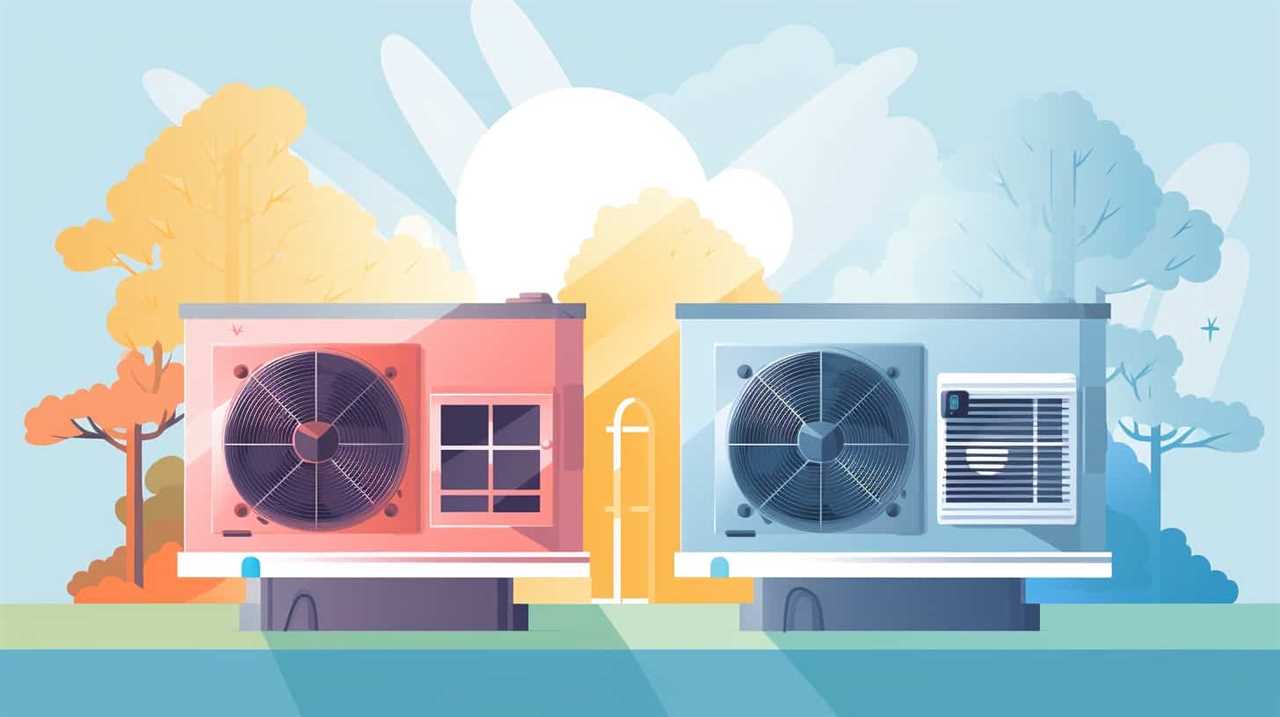
-
Heat exchangers help in improving the overall energy efficiency of heat pumps by minimizing energy losses during the heat transfer process.
-
They enable the heat pump system to function at optimal performance levels by ensuring efficient heat transfer between the refrigerant and the surrounding environment.
-
Heat exchangers also contribute to the longevity and reliability of heat pump systems by preventing the accumulation of impurities or debris that could hinder their performance.
Understanding the role of heat exchangers in heat pump operations is crucial for analyzing the efficiency and performance of heat pumps’ thermal energy transfer.
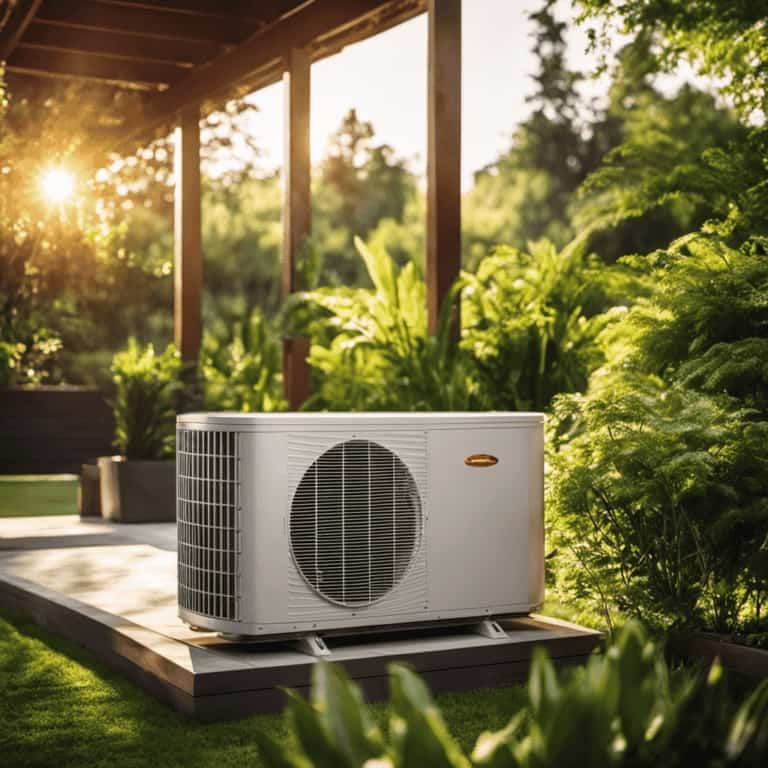
Analyzing the Efficiency and Performance of Heat Pumps’ Thermal Energy Transfer
The efficiency and performance of heat pumps’ thermal energy transfer can be analyzed through various metrics and measurements.
One important aspect to consider is the energy consumption of the heat pump system. By analyzing the energy consumption, we can determine how efficiently the heat pump is converting electrical energy into thermal energy. This can be done by monitoring the electrical input power and comparing it to the heat output.
Another important factor is evaluating the environmental impact of the heat pump. This involves assessing the amount of greenhouse gas emissions associated with the operation of the heat pump.
Frequently Asked Questions
How Much Does a Heat Pump Cost to Install?
Installing a heat pump can vary in cost due to several factors. These include the type and size of the heat pump, the complexity of the installation, and any additional components needed. It’s important to consider heat pump efficiency to ensure long-term savings.

What Is the Lifespan of a Heat Pump?
The lifespan of a heat pump depends on various factors such as regular maintenance, usage, and quality. Efficiency optimization and minimizing environmental impact are crucial considerations to ensure a long-lasting and sustainable heat pump system.
Can a Heat Pump Be Used for Both Heating and Cooling?
Yes, a heat pump can be used for both heating and cooling. This allows for efficient energy usage and provides the benefit of year-round comfort. It is a versatile system that maximizes heat pump efficiency.
Are Heat Pumps Suitable for All Types of Homes?
Heat pumps are suitable for all types of homes, as they offer high efficiency and significant energy savings. They provide both heating and cooling capabilities, making them versatile and cost-effective options for homeowners.
Is Regular Maintenance Required for Heat Pumps?
Regular maintenance is crucial for heat pumps. It ensures optimal performance and extends their lifespan. By keeping coils clean, checking refrigerant levels, and inspecting electrical connections, we can reap the benefits of energy efficiency and lower operating costs.
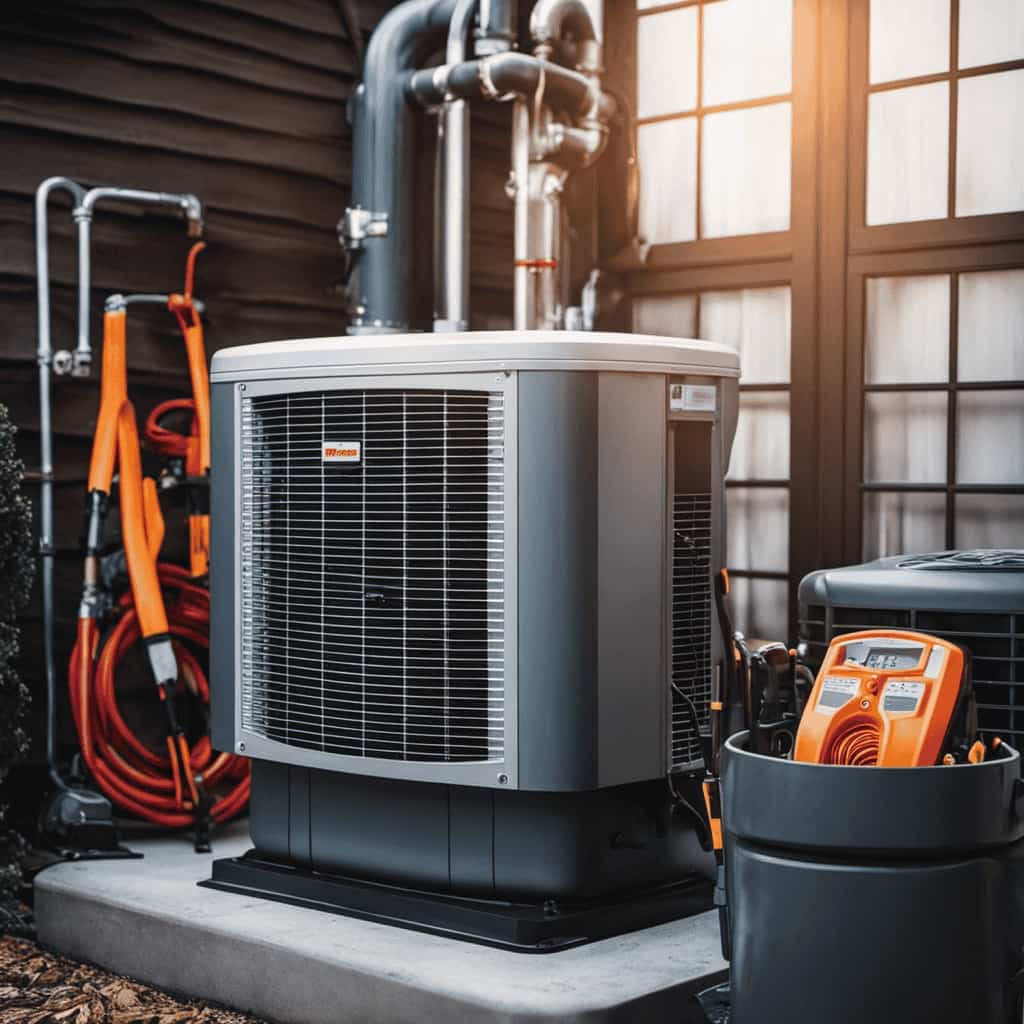
Conclusion
In conclusion, heat pumps play a crucial role in transferring thermal energy efficiently.
One interesting statistic is that heat pumps can achieve a coefficient of performance (COP) of up to 4, meaning they can provide four units of heating or cooling for every unit of electricity consumed.
This high efficiency makes heat pumps a sustainable and cost-effective solution for heating and cooling purposes.
Understanding the intricate mechanics and components of heat pumps allows us to appreciate their importance in energy-efficient systems.










